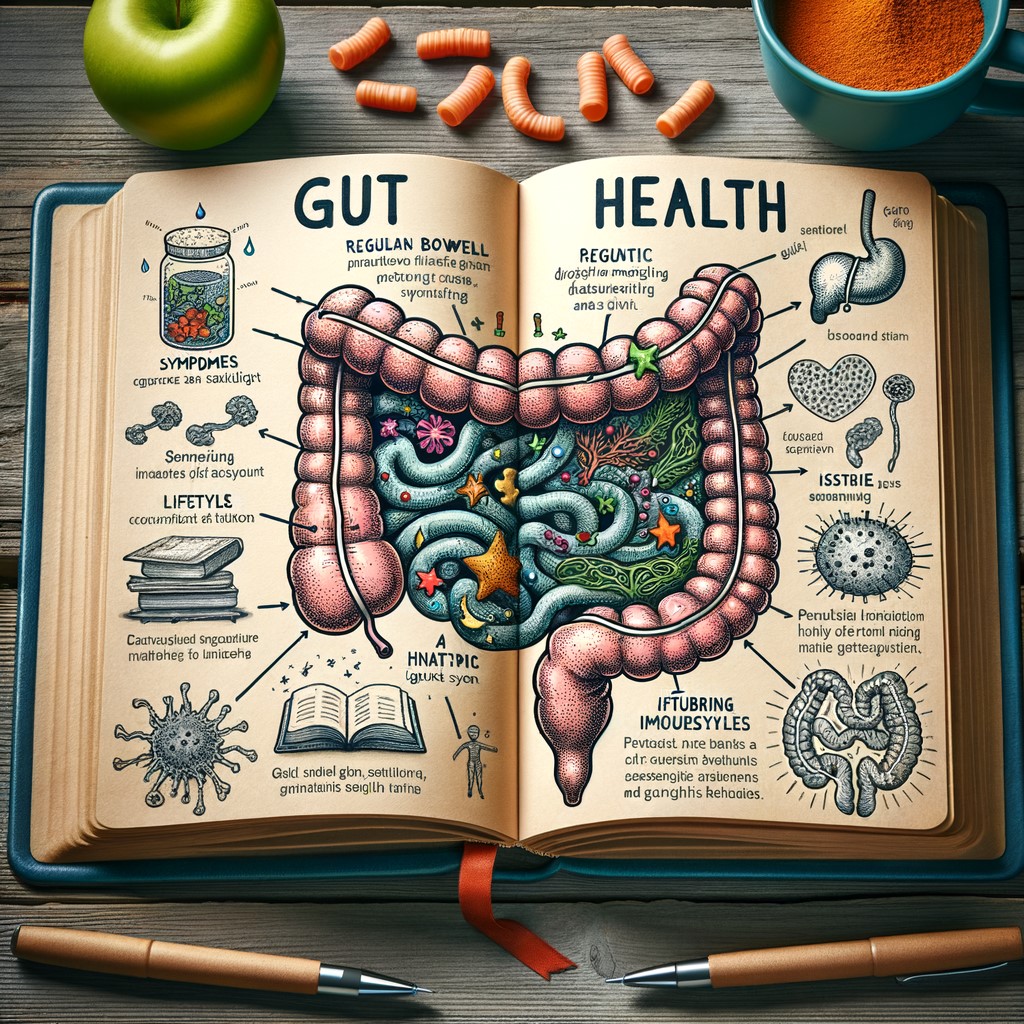Maintaining optimal gut health is crucial for overall wellness, as it affects not only digestion but also immunity, mood, energy levels, and even skin condition. However, many individuals struggle to recognize the signs of a healthy or unhealthy gut and may unknowingly suffer from conditions such as inflammation or leaky gut syndrome.
This comprehensive guide offers valuable insights into identifying key indicators of digestive health, understanding common symptoms associated with gastrointestinal issues, and implementing effective strategies—including dietary adjustments, natural remedies, targeted detoxes, and lifestyle modifications—to quickly and sustainably reset your digestive system. By learning how to nurture your gut microbiome through specific foods, vitamins, probiotics supplementation, and mindful habits, you can significantly enhance your quality of life.

Craving a taste of success? Savor it at Great Life Worldwide! Discover the delicious opportunities and take a free tour now.
1. Recognizing the Top 3 Signs of a Healthy Gut
A healthy gut is foundational to overall wellness, influencing everything from digestion and immunity to mood and energy levels. Recognizing key indicators of optimal gut health can help individuals proactively maintain their digestive well-being.
The first sign of a healthy gut is regular bowel movements that occur consistently without discomfort or strain. Ideally, this means daily elimination with stools that are soft yet formed, indicating efficient nutrient absorption and waste removal.
Secondly, minimal bloating or gas after meals signals effective digestion and balanced intestinal flora. Occasional mild bloating may be normal; however, frequent or severe symptoms often indicate underlying imbalances in gut bacteria or digestive enzyme production.
A healthy gastrointestinal tract efficiently breaks down food without excessive fermentation by harmful bacteria, resulting in comfortable digestion free from persistent abdominal distension.
Lastly, strong immune function serves as another critical indicator of robust gut health since approximately 70% of the body’s immune system resides within the gastrointestinal tract. Individuals with a thriving microbiome typically experience fewer infections and illnesses due to enhanced pathogen resistance provided by beneficial bacterial colonies living in their intestines. Additionally, they recover more quickly when illness does occur because these beneficial microbes actively support immune responses through anti-inflammatory actions and improved nutrient assimilation.
By paying close attention to these three primary signs—regular bowel habits without discomfort, minimal post-meal bloating or gas issues, and resilient immunity—individuals can confidently assess their current state of digestive health while taking proactive steps toward maintaining long-term gastrointestinal wellness.
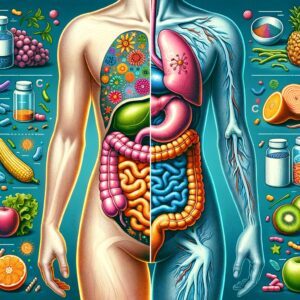
Your potential is a diamond! Polish it at Great Life Worldwide and see how it can make you shine. Claim your free tour today!
2. Identifying Common Symptoms of an Unhealthy or Inflamed Gut
Recognizing the symptoms associated with an unhealthy or inflamed gut is crucial for addressing digestive issues promptly and effectively. One of the most common indicators includes persistent bloating, which often occurs shortly after meals and can be accompanied by discomfort or abdominal pain. Bloating typically indicates that your digestive system is struggling to break down food efficiently, leading to excessive gas production.
Another frequent symptom is irregular bowel movements, including constipation, diarrhea, or alternating between the two conditions. These irregularities suggest imbalances in gut bacteria or inflammation within the intestinal lining that disrupt normal digestion processes. Additionally, chronic fatigue may also indicate poor gut health; when nutrient absorption becomes compromised due to inflammation or bacterial imbalance, energy levels decline significantly.
Skin problems, such as acne flare-ups, eczema outbreaks, and psoriasis, can also reflect underlying gut issues, as skin health closely correlates with digestive wellness. An inflamed gut allows toxins and harmful substances into circulation more readily through increased intestinal permeability—often referred to as “leaky gut”—triggering inflammatory responses throughout the body.
Lastly, mood disturbances, including anxiety and depression, have been linked directly to poor gastrointestinal function because approximately 90% of serotonin, the neurotransmitter responsible for mood regulation, is produced in our intestines. Consequently, disruptions within this delicate ecosystem negatively impact emotional well-being alongside physical health concerns.
By identifying these common symptoms early on—bloating, discomfort after eating meals regularly, inconsistent bowel habits, unexplained fatigue, persistent skin irritations, and noticeable shifts in mental clarity—you empower yourself to take proactive measures aimed at restoring optimal digestive balance swiftly before complications escalate further over time.
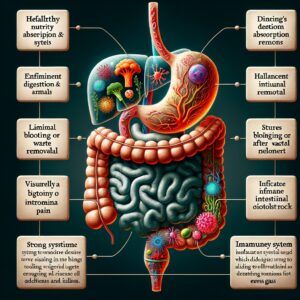
Your dream life is calling! Answer at Great Life Worldwide and see how it can make it a reality. Claim your free tour now!
3. Understanding Leaky Gut Syndrome: Key Symptoms You Shouldn’t Ignore
Leaky gut syndrome, medically referred to as increased intestinal permeability, occurs when the lining of the digestive tract becomes compromised, allowing toxins, bacteria, and undigested food particles to pass through into the bloodstream. Recognizing its symptoms early is crucial for preventing further health complications.
One common symptom associated with leaky gut syndrome is persistent digestive discomfort. Individuals often experience bloating, gas, diarrhea, or constipation due to inflammation and irritation within their gastrointestinal tract. These symptoms may be chronic or intermittent, but typically persist despite dietary adjustments.
Another key indicator of leaky gut syndrome involves heightened sensitivity or allergic reactions to certain foods. As foreign substances enter the bloodstream through a compromised intestinal barrier, the immune system responds aggressively by triggering inflammatory responses that manifest as food intolerances or allergies. Common culprits include gluten-containing grains such as wheat and barley; dairy products; soy-based foods; eggs; nuts; and processed sugars.
Additionally, individuals suffering from leaky gut frequently report experiencing fatigue and brain fog—symptoms linked directly to systemic inflammation caused by toxins entering circulation via damaged intestinal walls. Chronic fatigue can significantly impact daily productivity levels, while cognitive impairment affects memory retention capabilities and overall mental clarity.
Skin conditions like eczema or acne outbreaks are also prevalent among those dealing with this condition, as skin health closely correlates with internal inflammation stemming from poor digestion processes, specifically related to impaired nutrient absorption capabilities in the intestines of affected patients.
4. Natural Methods to Eliminate Bad Bacteria and Reduce Inflammation in Your Gut
Restoring gut health naturally involves targeted strategies that eliminate harmful bacteria while simultaneously reducing inflammation. One of the most effective approaches is to incorporate probiotics into your daily routine, either through supplementation or by consuming fermented foods such as yogurt, kefir, sauerkraut, kimchi, and kombucha. Probiotics introduce beneficial bacteria strains, such as Lactobacillus and Bifidobacterium, into the digestive tract, helping to crowd out pathogenic microbes responsible for inflammation.
Additionally, prebiotic-rich foods play a crucial role by nourishing beneficial gut flora. Foods high in dietary fiber, such as garlic, onions, asparagus, bananas, oats, and flaxseeds, serve as fuel for the growth of healthy bacteria. Consuming these regularly supports microbial balance within the gastrointestinal system.
Herbal remedies also offer potent anti-inflammatory properties that soothe irritated intestinal linings and combat harmful bacterial overgrowth. Herbs like ginger root possess potent anti-inflammatory effects; turmeric contains curcumin, which reduces gut inflammation significantly; oregano oil exhibits antimicrobial activity against pathogens; peppermint tea can alleviate bloating symptoms associated with bacterial imbalance.
Furthermore, lifestyle adjustments are essential components of natural healing methods designed to improve gut health. Reducing stress through mindfulness practices, such as meditation or yoga, helps decrease cortisol levels, which are directly linked to increased intestinal permeability (also known as a “leaky gut”). Regular physical exercise promotes better digestion by enhancing blood circulation throughout the digestive organs, while facilitating the elimination of toxins from tissues.
By combining probiotic supplementation with prebiotic-rich nutrition choices, alongside herbal therapies and mindful lifestyle habits that focus on stress reduction techniques, individuals can effectively eliminate harmful bacterial populations naturally, while substantially reducing overall gastrointestinal inflammation levels for improved long-term wellness outcomes.
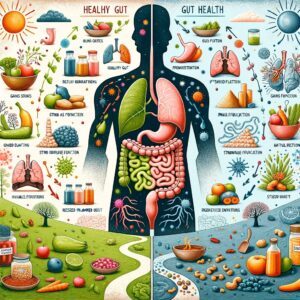
Unlock Your Potential—Start Your GreatLife Journey Today!
5. How to Perform an Effective 3-Day Gut Detox and Reset Your Digestive System Quickly
Conducting a targeted 3-day gut detox can significantly enhance digestive function, reduce inflammation, and effectively reset your gastrointestinal system. Begin by eliminating processed foods, sugars, alcohol, caffeine, dairy products, gluten-containing grains, and artificial additives from your diet during this period. Instead, focus on consuming nutrient-dense whole foods, such as leafy greens (spinach or kale), cruciferous vegetables (broccoli or cauliflower), lean proteins like chicken or fish, healthy fats (including avocado and olive oil), and fermented foods like sauerkraut or kimchi.
Hydration is crucial throughout the detoxification process; aim for at least eight glasses of purified water daily to flush toxins effectively from your body. Incorporating herbal teas containing ginger or peppermint can further soothe digestion while reducing bloating symptoms. Additionally, consider supplementing with probiotics to replenish beneficial gut bacteria quickly, as this supports overall digestive balance.
To enhance toxin elimination during these three days, incorporate gentle physical activities, such as yoga stretches designed explicitly for improved digestion, along with moderate walking sessions lasting approximately 20 minutes each day.
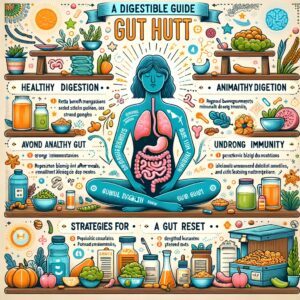
Activate the Power of Personalized Wellness—Sign On Today!
6. Foods, Drinks, and Vitamins That Rapidly Heal and Strengthen Your Gut Lining
Incorporating specific foods, beverages, and vitamins into your diet can significantly accelerate the healing process of your gut lining while enhancing overall digestive health. Fermented foods such as sauerkraut, kimchi, kefir, and yogurt are rich in probiotics that replenish beneficial bacteria within the gut microbiome. These probiotics help restore balance to intestinal flora, reduce inflammation, and support nutrient absorption.
Bone broth is another powerful dietary addition known for its high collagen content. Collagen contains amino acids like glycine and proline that directly repair damaged intestinal tissues by strengthening the mucosal barrier of the gut lining. Additionally, consuming omega-3 fatty acid-rich foods such as salmon or flaxseeds can effectively reduce inflammation throughout the gastrointestinal tract.
Beverages like ginger tea or aloe vera juice also play a crucial role in soothing irritated digestive systems due to their anti-inflammatory properties. Ginger tea aids digestion by reducing bloating and discomfort, while aloe vera juice helps heal ulcers or lesions along the intestinal wall.
Vitamins are equally essential for rapid gut restoration, particularly vitamin D, which supports immune function within the digestive system and promotes healthy bacterial diversity. Vitamin A contributes to maintaining mucosal integrity, whereas zinc supplementation has been shown to enhance tight junctions between cells in your intestines, thus preventing leaky gut syndrome from developing further.
Strategically incorporating these nutrient-dense foods, along with targeted vitamins, into daily meals or supplement routines consistently over time will rapidly promote healing processes within your gastrointestinal tract, leading to optimal long-term digestive wellness outcomes.
7. Maintaining Long-Term Gut Health: What to Eat, Avoid, and Lifestyle Habits for Optimal Digestion
Maintaining long-term gut health requires consistent dietary choices and lifestyle habits that support optimal digestion. Prioritize a diet rich in fiber from fruits, vegetables, whole grains, nuts, seeds, and legumes to promote regular bowel movements and nourish beneficial gut bacteria. Incorporating fermented foods such as yogurt with live cultures, kefir, sauerkraut, kimchi, or kombucha can further enhance the diversity of your microbiome by introducing probiotics into your digestive system.
Conversely, it’s essential to limit or avoid certain foods known to negatively impact gut health. Highly processed foods containing artificial additives and preservatives can disrupt microbial balance and trigger inflammation within the digestive tract. Excessive sugar intake should also be minimized since it feeds harmful bacteria strains that may lead to dysbiosis—a condition characterized by an imbalance between beneficial and pathogenic microorganisms in the gut.
In addition to dietary adjustments, adopting specific lifestyle practices significantly contributes to maintaining healthy digestion over time. Regular physical activity stimulates intestinal motility while reducing stress levels, both of which are critical factors that positively influence gastrointestinal function. Adequate hydration throughout the day supports efficient nutrient absorption processes in your intestines; aim for at least eight glasses of water daily, depending on your individual needs.

Unlock Peak Performance—Personalized Nutrition Starts Here.
Conclusion:
Achieving lasting gut health requires ongoing awareness, coupled with proactive measures explicitly tailored to improve digestion efficiency while reducing inflammation within the gastrointestinal tract. Through recognizing early warning signs like bloating discomforts after meals or irregular bowel movements; addressing critical concerns such as leaky gut syndrome promptly; adopting beneficial dietary practices rich in fiber-rich whole foods alongside fermented products; incorporating powerful anti-inflammatory herbs along with targeted vitamin supplements; performing periodic short-term detoxification regimens effectively—individuals can rapidly heal their intestinal lining while strengthening overall digestive resilience long-term. Ultimately, maintaining consistent healthy eating patterns, combined with effective stress management techniques, ensures sustained improvements in both physical well-being and emotional balance, empowering you toward lifelong vitality rooted in robust digestive wellness.

